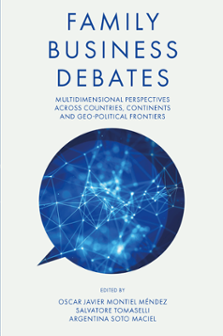
Index
ISBN: 978-1-80117-667-5, eISBN: 978-1-80117-666-8
Publication date: 28 November 2022
Citation
(2022), "Index", Montiel Méndez, O.J., Tomaselli, S. and Maciel, A.S. (Ed.) Family Business Debates, Emerald Publishing Limited, Leeds, pp. 383-390. https://doi.org/10.1108/978-1-80117-666-820221019
Publisher
:Emerald Publishing Limited
Copyright © 2023 Oscar Javier Montiel Méndez, Salvatore Tomaselli and Argentina Soto Maciel. Published under exclusive licence by Emerald Publishing Limited
INDEX
- Prelims
- Part I Theory
- Chapter 1 Family Business Research: 5th Wave Perspectives
- Chapter 2 Starting at the Beginning: A Scoping Review of Family Business Founders
- Chapter 3 Critical Studies in Family Businesses: What Are We Afraid Of?
- Chapter 4 Philosophical Foundations of Family Business Development
- Chapter 5 Pedagogical Strategies for Family Business Members From a Lifelong Learning Perspective
- Chapter 6 The Social Family Enterprise: Towards a Disruptive Approach to Social Entrepreneurship
- Part II Practice
- Chapter 7 Family Business Entrepreneurial Ecosystem: An Explorative Approach
- Chapter 8 Japanese Shinise: Long-Standing Businesses and Their Strategies to Protect the ie Under Extreme Environments
- Chapter 9 Australian Family Businesses: Ready to Thrive Post COVID-19?
- Chapter 10 From Small Business to Large Family Business: Discussions Around Development and Evolution of Companies in Latin America and Spain
- Chapter 11 Knowledge on Boards of Directors of Family Firms: From Developed Economies to Latin America
- Chapter 12 Managing Paradoxes in Family Firms: A Closer Look at Public Politics in Spain
- Chapter 13 Family Business in Latin America: A Contextual Approach Based on Three Cases From the Puuc Biocultural Region
- Chapter 14 Enabling Family Business Resilience – The Role of Female Leadership: Evidence From a Chinese Family Business
- Chapter 15 Sadism, Heterotopia, and Entrepreneurship: The Role of the “Family” in Family Business
- Chapter 16 Power and Corruption in Family Business: Perspectives and Cases
- Chapter 17 True Entrepreneur versus False Entrepreneur: Implications for Family Business
- Chapter 18 The Impact of Entrepreneurial Orientation on Debt Financing of Family Businesses: Evidence From Nigeria
- Testimonial (Family Business Consultant)
- Index